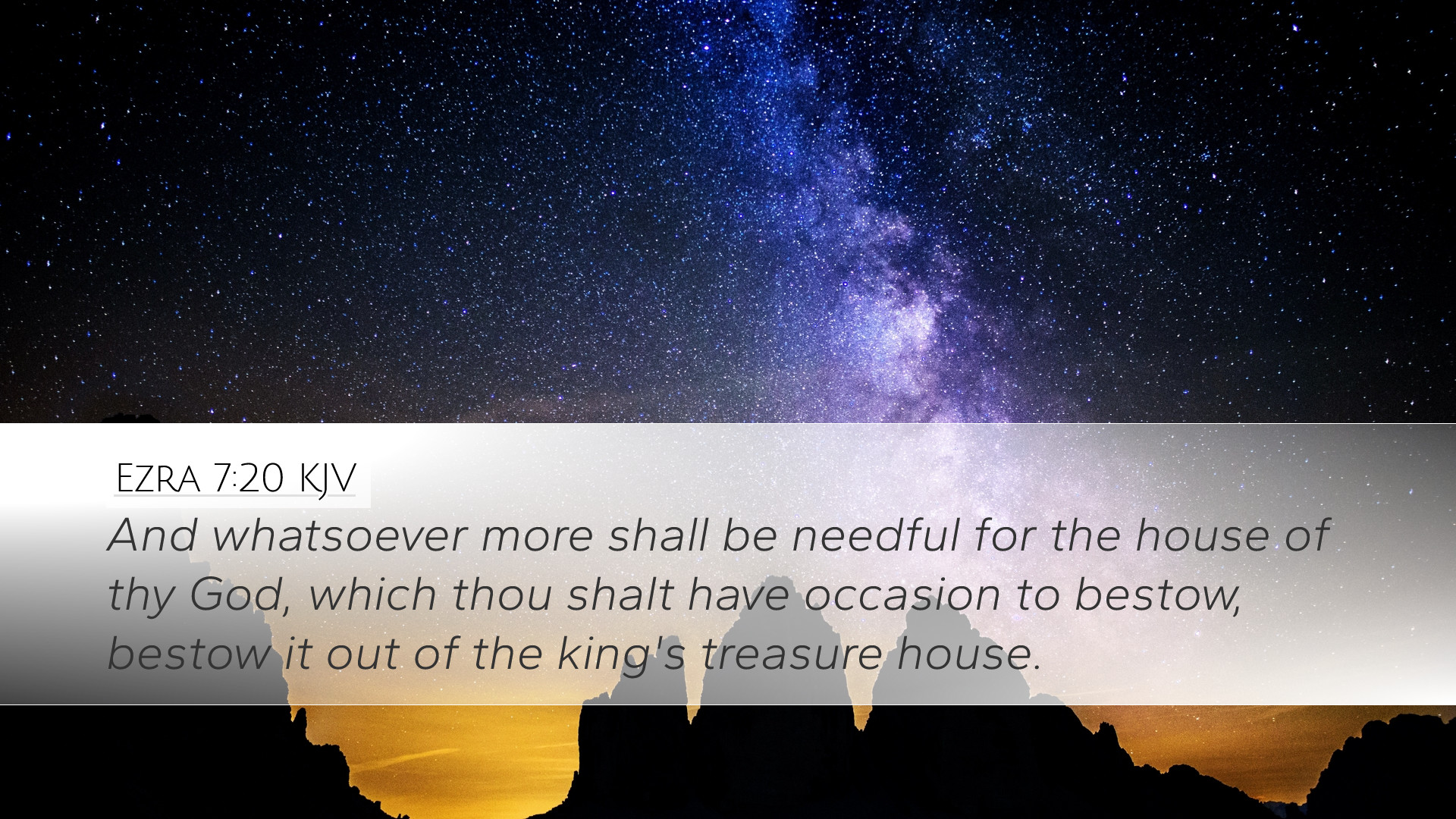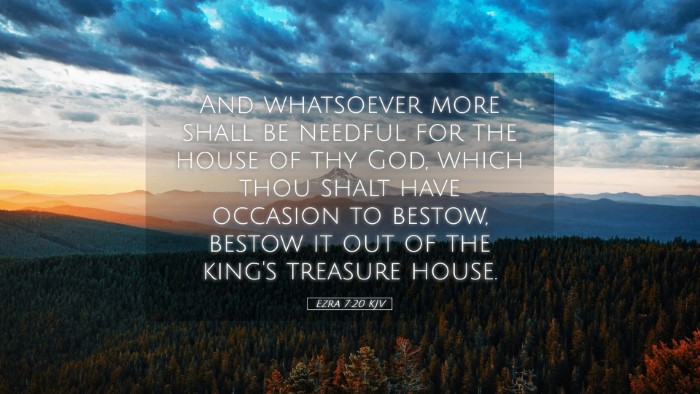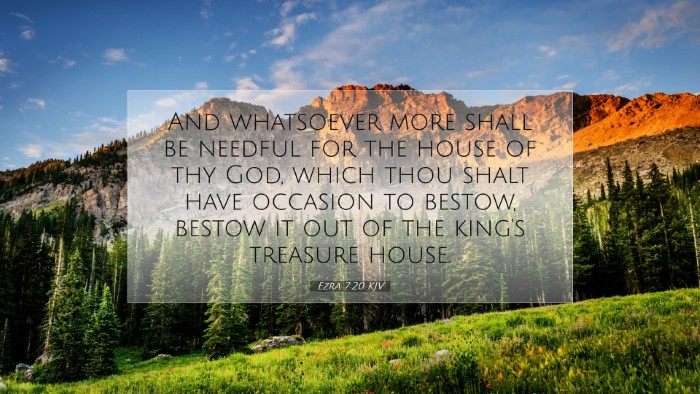Old Testament
Genesis Exodus Leviticus Numbers Deuteronomy Joshua Judges Ruth 1 Samuel 2 Samuel 1 Kings 2 Kings 1 Chronicles 2 Chronicles Ezra Nehemiah Esther Job Psalms Proverbs Ecclesiastes Song of Solomon Isaiah Jeremiah Lamentations Ezekiel Daniel Hosea Joel Amos Obadiah Jonah Micah Nahum Habakkuk Zephaniah Haggai Zechariah MalachiEzra 7:20
Ezra 7:20 KJV
And whatsoever more shall be needful for the house of thy God, which thou shalt have occasion to bestow, bestow it out of the king's treasure house.
Ezra 7:20 Bible Commentary
Commentary on Ezra 7:20
Ezra 7:20: "And whatsoever shall seem good to thee, and to thy brethren, to do with the silver and gold, that do after the will of your God."
Introduction
The Book of Ezra serves as a critical narrative in the restoration of the Jewish nation after the Babylonian exile. Ezra 7:20 provides insight into the authority and freedom granted to Ezra and the importance of divine guidance in matters pertaining to the temple and worship. Various public domain commentaries offer profound reflections on this verse, which is pivotal for understanding the responsibilities assigned to leaders in the ministry.
Matthew Henry’s Commentary
Matthew Henry emphasizes the significance of divine commission bestowed upon Ezra. He remarks that the silver and gold, which were provided by the king, symbolize the resources necessary for the worship of God. Henry notes that Ezra is granted considerable authority in determining how these assets should be utilized.
- Divine Authority: Henry highlights the importance of Ezra’s leadership, which comes from both secular and divine authority. The king’s decree confirms Ezra’s capability to act on behalf of God.
- Collaborative Decision Making: The reference to Ezra’s brethren indicates the incorporation of collective wisdom within the community. Henry points out that spiritual leaders must often work collaboratively to discern God's will.
- Pragmatism in Worship: It is vital that whatever is deemed good by Ezra and his brethren aligns with God’s will. The principles of worship should always reflect spirituality and practicality in serving God.
Albert Barnes’ Notes
Albert Barnes provides detailed exposition on the implications of leadership and stewardship reflected in this verse. According to Barnes, the phrase “whatsoever shall seem good to thee” indicates a principle of autonomous governance granted to Ezra.
- Stewardship: Barnes points out that the resources entrusted to Ezra illustrate a broader theme of stewardship in ministry. Ezra is not merely a receiver of funds but is charged with the sacred task of using those resources wisely for God's glory.
- Encouragement for Wise Decisions: The emphasis on making decisions that align with the will of God encourages leaders to seek divine guidance in their planning and executing of ministry tasks.
- Practical Implications: Barnes also highlights that this verse encourages spiritual leaders to consider practical needs and the moral implications of their decisions within the congregation.
Adam Clarke’s Commentary
Adam Clarke offers a unique interpretation considering cultural, historical, and theological contexts. Clarke reflects on the broader implications of this verse concerning the role of Ezra as a scribe and leader.
- The Role of the Scribe: Clarke emphasizes that Ezra's role went beyond being a mere priest; he was a scribe well-versed in the law. Hence, he had the expertise to guide others in adhering to God’s instructions.
- Context of Authority: Clarke discusses how the Persian king's decree strategically positioned Ezra as a leader, corresponding to the expectations set forth in the Jewish law. This positions Ezra as a bridge between two cultures.
- The Movement of God's Will: Clarke sees this moment as a divine act in history, where God orchestrated the events leading to Israel's restoration. Thus, the verse accentuates the divine will operating through human decisions.
Theological Implications
Ezra 7:20 is a testament to God's sovereignty and the profound responsibilities resting upon leaders in the church. Each of the commentaries emphasizes key themes that remain relevant to pastors, students, and scholars:
- Divine Leadership: Leaders are called to act under divine authority, relying on God for wisdom and direction.
- Collective Discernment: Leadership in ministry should involve collaboration, inviting input from the community of faith.
- Resource Management: The application of funds and resources must always reflect godly stewardship and service towards others.
- Spiritual Guidance: Decisions made in ministry should be rooted in prayer and the pursuit of God's truth.
Conclusion
Ezra 7:20 encapsulates critical leadership principles that evoke contemplation and action among contemporary faith leaders. The synthesis of insights from Matthew Henry, Albert Barnes, and Adam Clarke provides a rich theological foundation, calling upon pastors and theologians to engage deeply with their responsibility as stewards of God's resources. The call for divine discernment and collective wisdom is a timeless reminder for all who aspire to lead the people of God.


